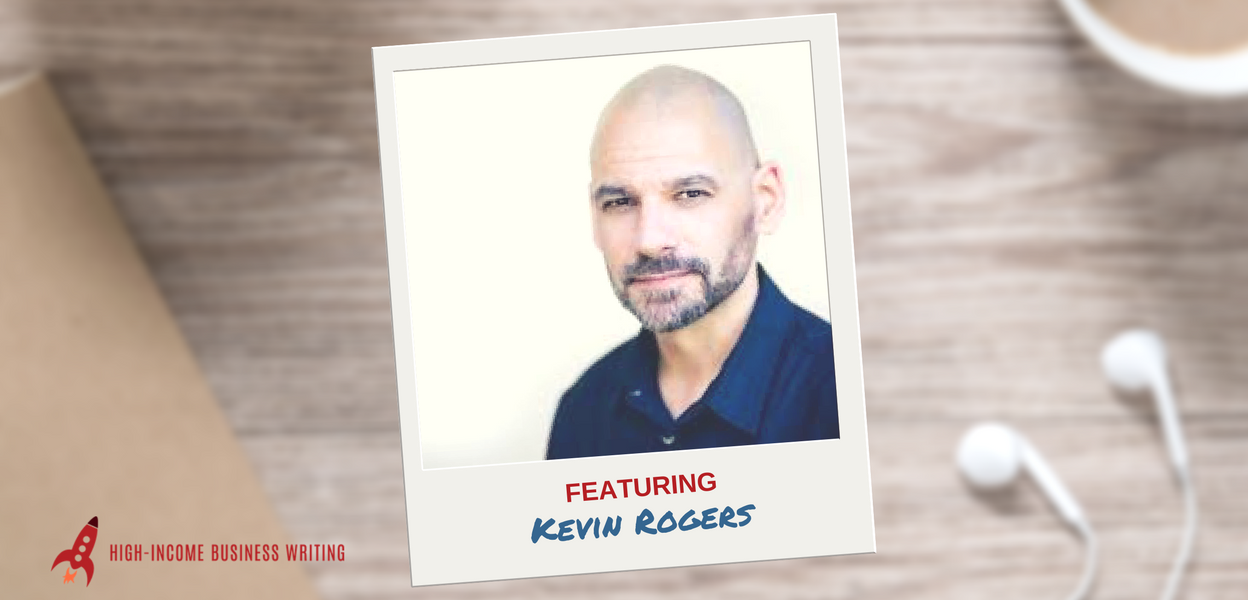Most copywriters understand the power of storytelling and humor in copy.
But how do you use these elements appropriately?
My guest this week explains how to do this right. His name is Kevin Rogers.
Kevin is one of the top copywriters in the biz. He’s the Amazon best-selling author of The 60-Second Sales Hook and founder of Copy Chief, a thriving community of the world’s top online marketers.
Kevin spent years traveling the country as a dead-broke stand-up comedian until he discovered how a simple joke formula could be used as a powerful marketing hook. He began to teach that formula to marketers. And these days, entrepreneurs and business owners all over the world use Kevin’s techniques to grow their profits and their businesses at record pace.
Today he’s is one of the most in-demand sales consultants online, working closely with high-volume information marketers, corporations and local brick and mortar businesses alike to turn around sluggish ad campaigns.
And in this interview, he reveals the formula he uses to inject humor and storytelling effectively in copy.
The notes that follow are a very basic, unedited summary of the show. There’s a lot more detail in the audio version. You can listen to the show using the audio player below. Or you can subscribe in iTunes to get this show delivered straight to the Podcasts app on your smart phone, tablet or iPod.


High-Income Business Writing with Ed Gandia
#106: Kevin Rogers’ Winning Formula for Improving Your Copy with Stories and Humor
Tell us about yourself
Kevin Rogers spent 10 years working as a freelance copywriter. Today, he has teamed with other copywriters to form Copy Chief, a forum based community where professional copywriters help business owners write great sales copy.
Before that, Kevin toured the U.S. for about 10 years as a standup comic.
How did you move from comedy to copywriting?
When Kevin stopped touring as a comic, he took a job with a telemarketing company. He didn’t know anything about the business, but the owner trusted him.
He ended up rewriting the company’s website. He became more and more interested in copywriting, but he didn’t know how to make money doing it.
He spent time educating himself and learning from others. Eventually, he found a mentor and started landing his first clients.
A decade later, he coaches a community of copywriters.
Is there a connection between humor and copywriting?
In both copywriting and comedy, you have to establish yourself quickly with your audience.
You have to get their attention fast and make a favorable impression. You need to establish your character immediately.
Writing copy (especially the emotional parts) is like a performance. You have to feel it.
Having a background in performance can help you figure out where you’ll lose readers and how to get them back.
You use humor and storytelling when talking about yourself to prospects. Can you tell us more about that?
To bond with prospects, you need to be transparent and relatable. And a great way to do that is to share your story and struggles with them.
When you share your personal struggle with people, they’re more inclined to trust you.
At the same time, you also talk about the knowledge and expertise you acquired while overcoming your struggle.
Essentially, it’s a condensed version of the hero’s journey.
You might think of your struggle as a weakness, but it’s not. Your struggle is an advantage—you wouldn’t be where are today without the struggle.
Tell us about the formula you use to communicate your (and your clients’) stories
Kevin created a formula you can use to get your story (and struggle) across to prospects in quickly. The formula is based on an old joke formula.
Formula for comedy:
- Identity ? struggle ? discovery ? surprise
Formula for sales (where the payoff is the result, instead of a surprise):
- Identity ? struggle ? discovery ? result
This formula resonates deeply with prospects if you’re genuine about it and not just using it as a tactic.
Copywriters use this formula unknowingly all the time. It’s instinctive.
What if you want to use this formula on behalf of clients, but you can’t identify their struggles?
Sometimes identifying a client’s struggle is like pulling teeth. Often, people are reluctant to share what are can be painful personal stories.
In those cases, you can instead apply the formula to describe the struggles of the client’s target market. The client’s prospects have struggles, and the client is offering a solution.
You can also use this approach when your client’s business came out of an unmet need in the market, not a personal struggle.
Can we incorporate this formula into any promotion?
You can use the formula almost anywhere. An obvious place to use it is as part of an opt-in for a lead magnet. You can use it in sales letters, email and when networking in person.
You can also expand on the formula and add more elements to it.
The formula provides clarity on what you’re selling, whom you’re selling to, and why you’re selling.
What advice do you have for direct response copywriters who’re learning the craft?
Don’t wait for permission to get started. Kevin coaches a lot of freelancers and all of them, on some level, suffer from imposter syndrome.
If your writing is good, then get out there. Be honest about yourself and charge a fair fee.
Most people wait too long to get started because they feel like a fraud.
Where can listeners learn more about you?
Kevin’s book is The 60-Second Sales Hook. You can buy it on Amazon or get it for free at Kevin’s website: copychief.com.
You can also join his online community. Members can post their copy to the site and get feedback from other members.






